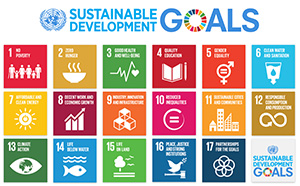Challenge Driven Education
Challenge Driven Education is a learning approach where students collaborate in projects that are addressing societal challenges related to sustainable development. To promote further development and implementation of challenge-driven education, KTH has developed the teacher training course LH233V Teaching and learning for challenge-driven education.
Background
The grand challenges for humanity in the 21st century, for example as expressed by UN:s 2030 Agenda and the Sustainable Development Goals, are calling for substantial transformations of our global society, to ensure a healthy planet and sustainable living conditions for ourselves and future generations. These challenges are also drivers of change of the education system, where the traditional focus on developing students' knowledge within specific disciplines must be complemented to better support the students in preparing for living in and acting on these challenges.

Challenge-Driven Education (CDE) is an evolving learning approach that is implemented somewhat differently in different contexts. It is a project-based approach where students are learning by developing interventions or solutions to societal challenges related to sustainable development. The challenges, that constitutes the targets for the projects and the context for the learning, are commonly identified and explored in close collaboration with some external stakeholder, it can be a company, public authority, or from the civil society. Since such challenges typically have the character of 'wicked problems', it is however preferable to involve a multitude of different stakeholders and multi-disciplinary international student teams.
The objective with CDE is to create conditions for active, experiential, and transdisciplinary, learning where students’, in addition to applying and deepening disciplinary knowledge and professional skills, get opportunities to develop key competencies for sustainability. CDE can also enable transformative learning where students can question and change their own and others' ways of seeing and thinking about the world, and take action for transformative change. CDE has potential to have actual impact on the sustainable development and transformation of society, through mutual learning, innovation-capacity building, innovations emerging from the student projects, and by students becoming sustainability change agents.
